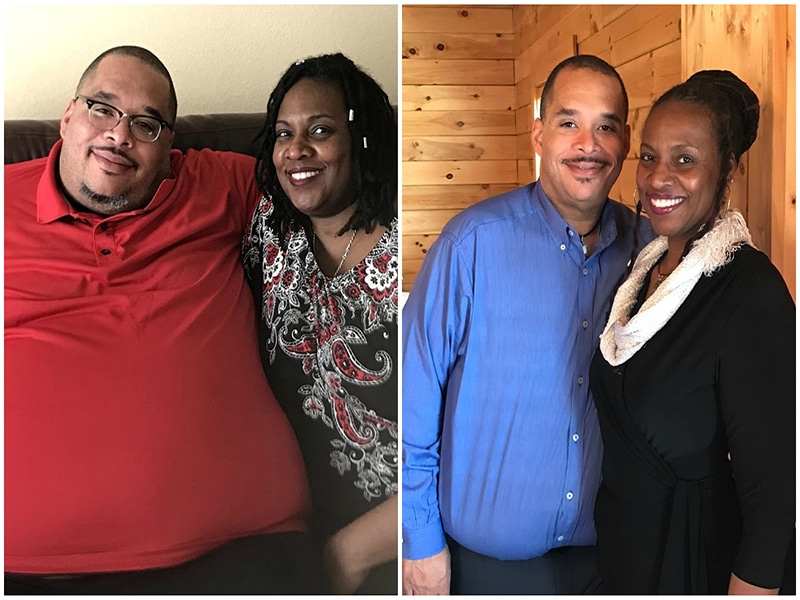Some spouses do everything together. For one couple, Chuck and Caretha Coulter, that included weight-loss surgery.
The husband and wife each had the same bariatric procedure at Methodist Dallas Medical Center just a year and a half apart.
The results have been dramatic. Together, the Cedar Hill couple has lost 280 pounds.
Chuck went first. “I just finally made a decision that I’ve got to do something different,” he says.
Life-long struggle
Before coming to Methodist Dallas, the Coulters struggled for years to lose weight and stick to healthy eating habits.
After years of being heavy, Chuck developed type 2 diabetes, a disease other family members had struggled with. He was also diagnosed with degenerative discs in his lower back from old football injuries.
It was his back problem that led him to undergo sleeve gastrectomy, a minimally invasive surgery that removes a large portion of the stomach to leave it thin and tubular.
“Having the procedure will force you to make a complete life change,” Chuck says.
His turnaround inspired his wife, Caretha, to address her own weight issues.
“Watching him go through the process kind of helped me kick-start mine,” says Caretha, a professional chef.
She opted for the same surgery as her husband because she couldn’t get around the kitchen as easily as she once did.
“It was hard for me to stand on my feet for long periods of time,” Caretha says. “I also had migraines and high blood pressure, a myriad of things I needed to fix.
“We smile more. My whole family has said that I’m a completely different person.”
— Caretha Coulter
Making a change
The couple consulted with Preeti Malladi, MD, FACS, FASMBS, bariatric surgeon on the medical staff at Methodist Dallas, who performed both weight-loss surgeries.
“The sleeve helps with portion control,” Dr. Malladi says. “The patient feels full with a small amount of food. They also feel less hungry.”
The procedure can be done through a few small incisions, about 5 to 10 millimeters each. Dr. Malladi then uses a camera and long instruments to remove part of the stomach.
“Patients do really well, and their pain is controlled,” she says. “It’s minimally invasive, and it’s very safe. I have a lot of patients who tell me they wish they did this sooner.”
But that doesn’t mean there’s no work involved.
New habits
Surgery is a powerful tool, Dr. Malladi says, but it’s not a silver bullet. Patients must also adopt new habits in order to make a lasting difference.
It’s a lesson the Coulters have taken to heart by leading more active lives: Caretha has trained for a 5K run, and Chuck starts his day with exercise.
They’ve also altered their diet by incorporating more fruits, vegetables, and protein while cutting out processed foods.
As a result, Caretha has lost about 80 pounds in less than a year, while Chuck has shed more than 200 pounds since his operation in 2018.
“The biggest victory for me was when I was able to come off my diabetes medicine,” Chuck says.
Fat tissue increases insulin resistance, which contributes to type 2 diabetes, Dr. Malladi explains. Many times, as patients lose weight, they need less medicine or can forgo it entirely. “Not only are they decreasing their insulin resistance, but they’re increasing their insulin production.”
Paying it forward
Chuck and Caretha attend Methodist Dallas’ monthly bariatric patient support group, a lifeline that’s become a big part of their journey. They learn from veteran attendees and educate newcomers.
Caretha’s culinary talents proved to be a great teaching tool. She’s introduced healthy recipes at group tasting events and expanded her catering business by cooking for other patients.
“She takes regular recipes and makes them bariatric-friendly, and you literally can’t tell the difference,” says Katherine Odom, BSN, RN, CBN, bariatric coordinator of Methodist Dallas’ weight management program. “It shows food can still be fun. It can be tasty and nutritious and have some variety.”
The key, Caretha says, is finding healthier alternatives for ingredients. Her faux potato salad, for example, features radishes instead of potatoes, and she’s learned to replace white flour with almond flour and egg noodles with lentil noodles.
The couple says what they’ve gained during their weight-loss journey far exceeds the pounds they’ve lost.
“I’ve grown so much mentally and spiritually from this,” Chuck says.
Caretha agrees they’re both happier these days.
“We smile more,” Caretha adds. “My whole family has said that I’m a completely different person.”

